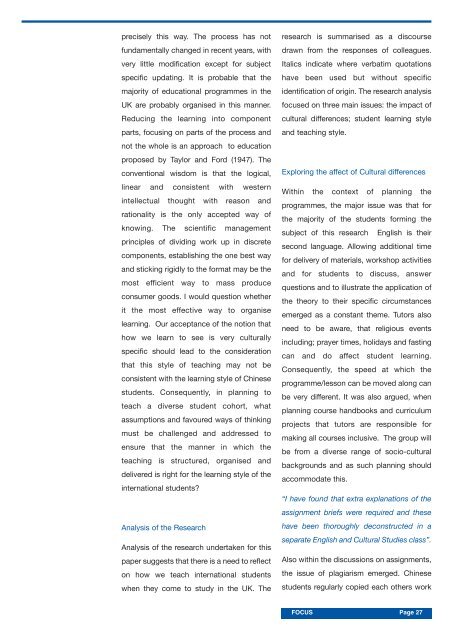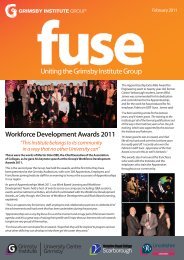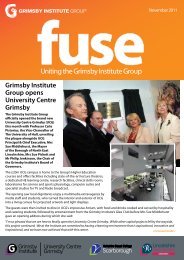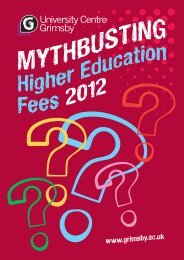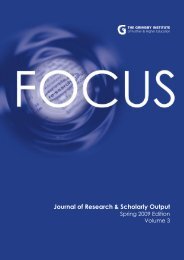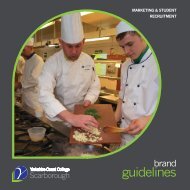Journal of Research & Scholarly Output 2006 - Grimsby Institute of ...
Journal of Research & Scholarly Output 2006 - Grimsby Institute of ...
Journal of Research & Scholarly Output 2006 - Grimsby Institute of ...
You also want an ePaper? Increase the reach of your titles
YUMPU automatically turns print PDFs into web optimized ePapers that Google loves.
precisely this way. The process has not<br />
fundamentally changed in recent years, with<br />
very little modification except for subject<br />
specific updating. It is probable that the<br />
majority <strong>of</strong> educational programmes in the<br />
UK are probably organised in this manner.<br />
Reducing the learning into component<br />
parts, focusing on parts <strong>of</strong> the process and<br />
not the whole is an approach to education<br />
proposed by Taylor and Ford (1947). The<br />
conventional wisdom is that the logical,<br />
linear and consistent with western<br />
intellectual thought with reason and<br />
rationality is the only accepted way <strong>of</strong><br />
knowing. The scientific management<br />
principles <strong>of</strong> dividing work up in discrete<br />
components, establishing the one best way<br />
and sticking rigidly to the format may be the<br />
most efficient way to mass produce<br />
consumer goods. I would question whether<br />
it the most effective way to organise<br />
learning. Our acceptance <strong>of</strong> the notion that<br />
how we learn to see is very culturally<br />
specific should lead to the consideration<br />
that this style <strong>of</strong> teaching may not be<br />
consistent with the learning style <strong>of</strong> Chinese<br />
students. Consequently, in planning to<br />
teach a diverse student cohort, what<br />
assumptions and favoured ways <strong>of</strong> thinking<br />
must be challenged and addressed to<br />
ensure that the manner in which the<br />
teaching is structured, organised and<br />
delivered is right for the learning style <strong>of</strong> the<br />
international students?<br />
Analysis <strong>of</strong> the <strong>Research</strong><br />
Analysis <strong>of</strong> the research undertaken for this<br />
paper suggests that there is a need to reflect<br />
on how we teach international students<br />
when they come to study in the UK. The<br />
research is summarised as a discourse<br />
drawn from the responses <strong>of</strong> colleagues.<br />
Italics indicate where verbatim quotations<br />
have been used but without specific<br />
identification <strong>of</strong> origin. The research analysis<br />
focused on three main issues: the impact <strong>of</strong><br />
cultural differences; student learning style<br />
and teaching style.<br />
Exploring the affect <strong>of</strong> Cultural differences<br />
Within the context <strong>of</strong> planning the<br />
programmes, the major issue was that for<br />
the majority <strong>of</strong> the students forming the<br />
subject <strong>of</strong> this research English is their<br />
second language. Allowing additional time<br />
for delivery <strong>of</strong> materials, workshop activities<br />
and for students to discuss, answer<br />
questions and to illustrate the application <strong>of</strong><br />
the theory to their specific circumstances<br />
emerged as a constant theme. Tutors also<br />
need to be aware, that religious events<br />
including; prayer times, holidays and fasting<br />
can and do affect student learning.<br />
Consequently, the speed at which the<br />
programme/lesson can be moved along can<br />
be very different. It was also argued, when<br />
planning course handbooks and curriculum<br />
projects that tutors are responsible for<br />
making all courses inclusive. The group will<br />
be from a diverse range <strong>of</strong> socio-cultural<br />
backgrounds and as such planning should<br />
accommodate this.<br />
“I have found that extra explanations <strong>of</strong> the<br />
assignment briefs were required and these<br />
have been thoroughly deconstructed in a<br />
separate English and Cultural Studies class”.<br />
Also within the discussions on assignments,<br />
the issue <strong>of</strong> plagiarism emerged. Chinese<br />
students regularly copied each others work<br />
FOCUS Page Page 27


